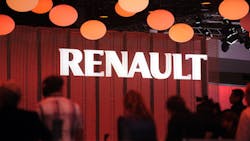Renault Recalls Vehicles Amid Failed Emissions Test
PARIS — Renault announced Tuesday that it will recall thousands of vehicles to make engine tweaks as the French carmaker grapples with emissions levels found to exceed anti-pollution norms in some of its cars.
About 15,800 diesel vehicles are being called back due to an error “detected and corrected” in mid-2015, Renault’s head of engineering said, broadly confirming an earlier announcement by the ecology minister.
France’s second-biggest auto manufacturer — the French state owns nearly 20% of the company — is under the spotlight after it emerged last week that anti-fraud investigators had raided several company sites, sending stocks plunging.
Amid fears Renault could be caught up in an emissions scandal similar to the one engulfing Volkswagen, officials announced that no pollution cheating software was found on Renault cars. A French government-appointed commission said, however, that the company’s diesel cars had failed pollution tests.
Director of engineering Gaspard Gascon-Abellan told reporters Tuesday that Renault had discovered in July “a calibration error” in the emissions cutting system of its diesel engines. The problem led to nitrogen oxide and sulfur not being properly eliminated so that the particle filter was “completely losing its efficiency.” The error was fixed at the start of September and the recall began two months later.
The recall concerns Renault’s diesel Captur model produced in Europe between February and September last year.
Ecology Minister Segolene Royal, whose portfolio includes transport, said on RTL radio that Renault was recalling 15,000 new vehicles “to check them and adjust them correctly so that the filtration system works” in all temperatures. “New cars must meet the norms,” she said, adding that the adjustment could be quickly done. “To correctly adjust an engine takes half a day.”
She also said other carmakers found to have exceeded the norms had agreed to appear before the commission but declined to name them.
The commission, set up in the wake of the VW case, tested vehicles from a total of eight foreign and French brands, finding carbon dioxide and nitrogen dioxide emissions from Renault cars to be too high, as well as those in some non-French models.
Renault’s deputy director for competitiveness Thierry Bollore also insisted during Tuesday’s news conference that the company “respects all the norms.”
On Monday, Renault pledged to draw up a “technical plan” over coming weeks to bring down harmful emissions. It involves improving pollution cutting systems in diesel engines to be modified through a software update from July. “There will be a proposal to customers but not a recall since the vehicles conform,” Bollore told reporters.
Renault sales director Thierry Koskas insisted Monday that the company was not cheating but acknowledged a problem had emerged between test and real conditions on the road.
“I want to restate this very firmly,” he said, presenting the group’s 2015 sales results. “We are not using any software or other (fraudulent) methods. In test conditions, we respect emissions norms. But when we are no longer in test conditions, there is indeed a difference between real conditions and control conditions, that is a fact.”
Renault had already announced last month that it would spend 50 million euros ($54.50 million) on emissions reduction after German consumer body Umwelthilfe found what it called “frightening” pollution levels when testing a Renault Espace Diesel model.
Shares in Renault and other car companies fell last week amid fears that the emissions scandal embroiling VW may be spreading sector-wide. The German giant was forced to admit in September that it had fitted 11 million diesel engines worldwide with devices aimed at cheating emissions tests.
Renault stocks slumped by more than 20% during Thursday’s trading session after unions reported the raids by anti-fraud investigators in early January, before closing around 10 percent lower.
Copyright Agence France-Presse, 2016
About the Author
Agence France-Presse
Copyright Agence France-Presse, 2002-2025. AFP text, photos, graphics and logos shall not be reproduced, published, broadcast, rewritten for broadcast or publication or redistributed directly or indirectly in any medium. AFP shall not be held liable for any delays, inaccuracies, errors or omissions in any AFP content, or for any actions taken in consequence.
